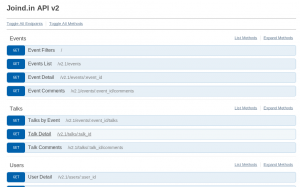I am a huge fan of
bit.ly and use their tools for a wide variety of different things. They recently did a big relaunch with some lovely new features, which are for the most part pretty good, but which are inaccessible in places. In particular, it seems that there aren’t any short URLs for the bundles – which is annoying for me as I use that feature a lot!
To get around this, I used their API to make a page which lists my bit.ly bundles, and creates shortlinks for each of them (once you’ve created a shortlink for a given URL once, bit.ly just re-uses the same ones the next time you ask to shorten the same URL, so this is less silly than it sounds).
In case the code is helpful, I thought I’d share. Continue reading →

